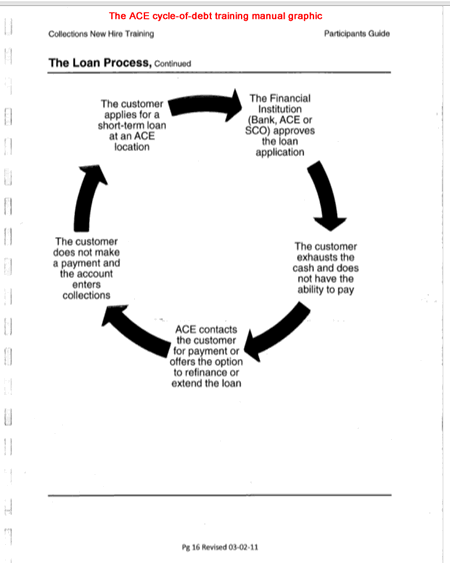
Ace Payday Loan Training Manual
WASHINGTON, D.C. — Today the Consumer Financial Protection Bureau (CFPB) took enforcement action against ACE Cash Express, one of the largest payday lenders in the United States, for pushing payday borrowers into a cycle of debt. The CFPB found that ACE used illegal debt collection tactics – including harassment and false threats of lawsuits or criminal prosecution – to pressure overdue borrowers into taking out additional loans they could not afford. ACE will provide $5 million in refunds and pay a $5 million penalty for these violations.
“ACE used false threats, intimidation, and harassing calls to bully payday borrowers into a cycle of debt,” said CFPB Director Richard Cordray. “This culture of coercion drained millions of dollars from cash-strapped consumers who had few options to fight back. The CFPB was created to stand up for consumers and today we are taking action to put an end to this illegal, predatory behavior.”
ACE is a financial services company headquartered in Irving, Texas. The company offers payday loans, check-cashing services, title loans, installment loans, and other consumer financial products and services. ACE offers the loans online and at many of its 1,500 retail storefronts. The storefronts are located in 36 states and the District of Columbia.
Payday loans are often described as a way for consumers to bridge a cash-flow shortage between paychecks or other income. They are usually expensive, small-dollar loans that must be repaid in full in a short period of time. A March 2014 CFPB study found that four out of five payday loans are rolled over or renewed within 14 days. It also found that the majority of all payday loans are made to borrowers who renew their loans so many times that they end up paying more in fees than the amount of money they originally borrowed.
The CFPB has authority to oversee the payday loan market and began supervising payday lenders in January 2012. Today’s action resulted from a CFPB examination, which the Bureau conducted in coordination with the Texas Office of Consumer Credit Commissioner, and subsequent enforcement investigation.
Illegal Debt Collection Threats and Harassment
The CFPB found that ACE used unfair, deceptive, and abusive practices to collect consumer debts, both when collecting its own debt and when using third-party debt collectors to collect its debts. The Bureau found that ACE collectors engaged in a number of aggressive and unlawful collections practices, including:
· Threatening to sue or criminally prosecute: ACE debt collectors led consumers to believe that they would be sued or subject to criminal prosecution if they did not make payments. Collectors would use legal jargon in calls to consumers, such as telling a consumer he could be subject to “immediate proceedings based on the law” even though ACE did not actually sue consumers or attempt to bring criminal charges against them for non-payment of debts.
· Threatening to charge extra fees and report consumers to credit reporting agencies: As a matter of corporate policy, ACE’s debt collectors, whether in-house or third-party, cannot charge collection fees and cannot report non-payment to credit reporting agencies. The collectors, however, told consumers all of these would occur or were possible.
· Harassing consumers with collection calls: Some ACE in-house and third-party collectors abused and harassed consumers by making an excessive number of collection calls. In some of these cases, ACE repeatedly called the consumers’ employers and relatives and shared the details of the debt.
Pressured into Payday Cycle of Debt
The Bureau found that ACE used these illegal debt collection tactics to create a false sense of urgency to lure overdue borrowers into payday debt traps. ACE would encourage overdue borrowers to temporarily pay off their loans and then quickly re-borrow from ACE. Even after consumers explained to ACE that they could not afford to repay the loan, ACE would continue to pressure them into taking on more debt. Borrowers would pay new fees each time they took out another payday loan from ACE. The Bureau found that ACE’s creation of the false sense of urgency to get delinquent borrowers to take out more payday loans is abusive.
ACE’s 2011 training manual has a graphic illustrating this cycle of debt. According to the graphic, consumers begin by applying to ACE for a loan, which ACE approves. Next, if the consumer “exhausts the cash and does not have the ability to pay,” ACE “contacts the customer for payment or offers the option to refinance or extend the loan.” Then, when the consumer “does not make a payment and the account enters collections,” the cycle starts all over again—with the formerly overdue borrower applying for another payday loan.
The ACE cycle-of-debt training manual graphic is available at: http://files.consumerfinance.gov/f/201407_cfpb_graphic_ace-cash-express-loan-process.pdf
Enforcement Action
Under the Dodd-Frank Wall Street Reform and Consumer Protection Act, the CFPB has the authority to take action against institutions engaging in unfair, deceptive, or abusive practices. The CFPB’s order requires ACE to take the following actions:
· Pay $5 million in consumer refunds: ACE must provide $5 million in refunds to the overdue borrowers harmed by the illegal debt collection tactics during the period covered by the order. These borrowers will receive a refund of their payments to ACE, including fees and finance charges. ACE consumers will be contacted by a third-party settlement administrator about how to make a claim for a refund.
· End illegal debt collection threats and harassment: The order requires ACE to ensure that it will not engage in unfair and deceptive collections practices. Those practices include, but are not limited to, disclosing debts to unauthorized third parties; directly contacting consumers who are represented by an attorney; and falsely threatening to sue consumers, report to credit bureaus, or add collection fees.
· Stop pressuring consumers into cycles of debt: ACE’s collectors will no longer pressure delinquent borrowers to pay off a loan and then quickly take out a new loan from ACE. The Consent Order explicitly states that ACE may not use any abusive tactics.
· Pay a $5 million fine: ACE will make a $5 million penalty payment to the CFPB’s Civil Penalty Fund.
The full text of the Bureau’s Consent Order is available at: http://files.consumerfinance.gov/f/201407_cfpb_consent-order_ace-cash-express.pdf
Jer@TrihouseConsulting.com
To have these timely Posts delivered to your inbox, sign up below. Spam is for jerks! We are not jerks!!




